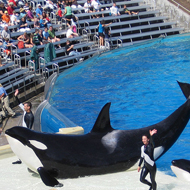
Decision hailed "a defining moment"
SeaWorld is set to end its controversial orca breeding programme, meaning its current group of orcas will be the last generation. The decision has been described as "a defining moment" marking "truly meaningful change".
In a statement, the company said: "SeaWorld has been listening and we're changing. Society is changing and we're changing with it."
The company had previously pledged to phase out its 'theatrical orca displays' in San Diego, replacing them with a new show focusing on natural behaviours.
SeaWorld has attracted strong criticism since the documentary Blackfish raised concerns about the treatment of captive performing orcas. Since the 2013 release of the film, SeaWorld has seen its visitor numbers and stocks plummet.
The company has not captured orcas from the wild for nearly 40 years and recently reaffirmed its pledge. The orcas currently being kept by SeaWorld were either born there or have lived most of their lives there.
While some groups have called for SeaWorld's remaining orcas to be released into the wild, the company says they could not survive as they would be unable to compete for food and would be exposed to unfamiliar diseases and man-made threats such as pollution.
The Humane Society of the United States (HSUS) worked alongside SeaWorld as it developed its reforms. While the two organisations have clashed for more than two decades, HSUS praised SeaWorld for its new policies, which it called 'a major step forward'.
Blackfish director Gabriela Cowperthwaite is quoted by HSUS as saying: "This is a defining moment. The fact that SeaWrodl is doing away with orca breeding marks truly meaningful change."
Image (c) Leon7/Wikimedia Commons CC BY SA 3.0



 The BSAVA has opened submissions for the BSAVA Clinical Research Abstracts 2026.
The BSAVA has opened submissions for the BSAVA Clinical Research Abstracts 2026.